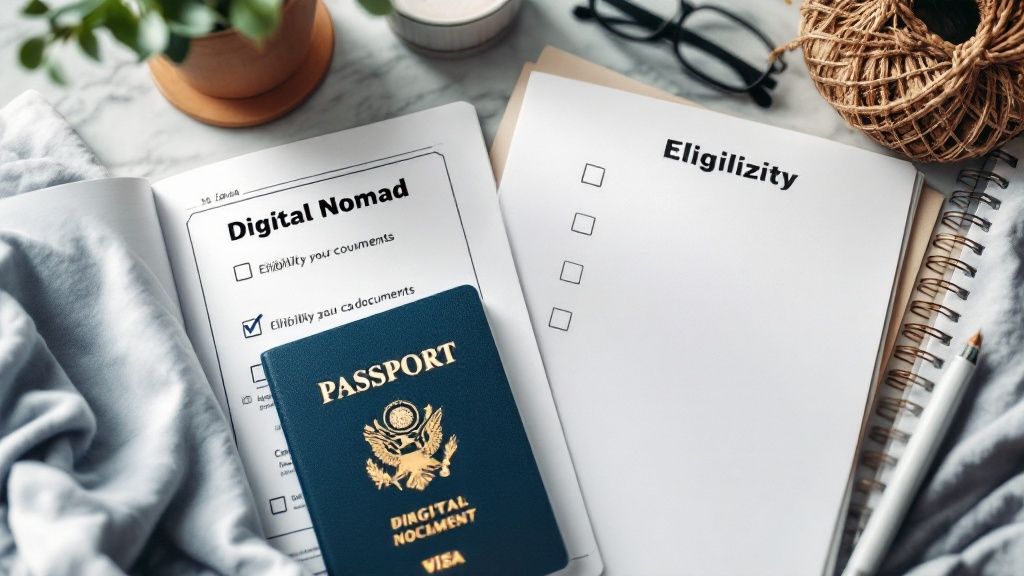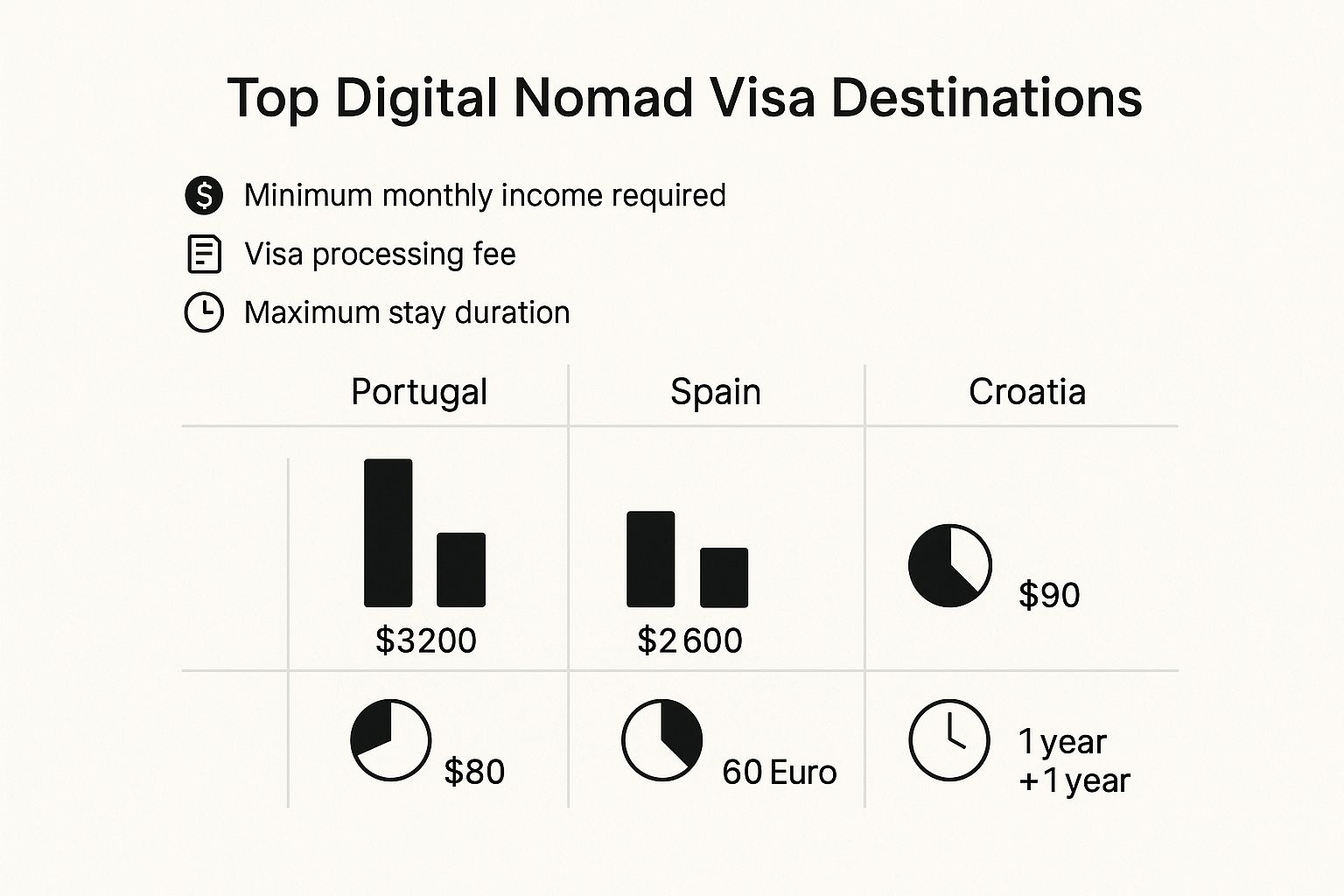Digital Nomad Visa Requirements Made Simple

Figuring out digital nomad visa rules can feel like a maze, but the idea behind it is pretty straightforward. Countries just want to see that you're a real remote worker who makes enough money from outside their borders to get by. Basically, you have to prove you can support yourself without taking a job from a local, all while pumping money into their economy with your everyday spending.
The Global Welcome Mat for Remote Workers
The old 9-to-5 office model is fading fast, and countries are catching on. Long-term stays abroad used to be just for people with a local job contract, but that's all changed. There’s now a dedicated path for professionals who just need a laptop and a decent internet connection to do their job. Enter the digital nomad visa.
Think of it as an official, long-term invitation. This special permit lets you legally live in a country, usually for a year or more, while you keep earning from clients or an employer back home or anywhere else. It’s a classic win-win. The host country gets your business—you're buying coffee, renting an apartment, and shopping locally. And you get to immerse yourself in a new culture without the stress of constant border hopping.
Why Countries Are Rolling Out the Red Carpet
This isn’t just a passing fad; it's smart economics. Governments are realizing that remote professionals are a great asset. These visa programs really took off after 2020, once the worldwide work-from-home experiment showed everyone that location-independent careers were here to stay.
The numbers tell the story. As of 2025, the map is dotted with options—over 70 countries now have specific visas for remote workers. What's really telling is that a massive 91% of these visas were created after 2020. It's a clear signal that attracting digital nomads is seen as a great way to boost local economies, especially by filling hotels and apartments during the slower tourist seasons.
Getting to the Heart of It
The whole point of these visas is to separate where you live from where you work. You're a resident in one country, but your job and your income are tied to another. This is the key, because it proves you won’t be competing for jobs with local citizens.
To get approved, you'll need to tick a few boxes that confirm this setup. While the specific digital nomad visa requirements change from country to country, they all boil down to proving the same three things:
- Your work is truly remote: You have to show that your job or business can be done from anywhere.
- You have a stable income: They need to know you can pay your bills without any trouble.
- You're a good guest: This usually means having health insurance and a clean criminal record.
Once you grasp this basic framework, the application process becomes much less intimidating, and you can start looking at some of the best cities for digital nomads to find your next home base.
Getting the Basics Right: The Core Visa Requirements

Before you start hunting for that perfect apartment in Lisbon or mapping out your weekend trips from Spain, you need to make sure you've got the fundamentals covered. Think of these core visa requirements as the unshakeable foundation of your entire application. Get these wrong, and everything else comes crashing down.
Just about every country with a remote work visa is going to vet you on three things: your ability to work remotely, your financial stability, and your health insurance. Each one is a critical checkmark to assure the host country that you can stand on your own two feet without becoming a drain on their resources.
Let’s dig into what officials are really looking for.
Proof of Remote Work: Are You a Real Digital Nomad?
First and foremost, you have to prove you’re actually a remote worker. It sounds obvious, but consulates need solid evidence that your income originates outside their country and that you aren't tied to a physical office. This is the entire logic behind the visa—you're bringing foreign currency in without taking a local job.
So, how do you make your case? It really depends on how you work:
-
For Employees: Your best bet is an official, signed letter from your employer. This isn't just a quick note; it needs to confirm your job title, state that you're a full-time permanent employee, and—most importantly—explicitly grant you permission to work remotely from their country. It should also list your current salary.
-
For Freelancers or Business Owners: You need to paint a clear picture of your business. This usually means pulling together active client contracts (the longer-term, the better), recent invoices, and a well-written letter explaining your business model and who you work for. A key detail: your clients must be outside the host country.
The Income Threshold: Show Me the Money
Next up, you have to prove you can support yourself. Governments set minimum income requirements to make sure you can afford the cost of living and actually contribute to their economy. It's their way of screening for people who won't end up needing financial help.
And let's be honest, digital nomads are attractive to host countries because they tend to be solid earners. The average remote professional pulls in around $124,170 annually, which is serious spending power. This is exactly what the income thresholds—usually between $2,000 to $5,000 a month—are designed to verify. You can dig into more stats about digital nomad visas at pumble.com.
The Bottom Line: That monthly income requirement isn't just a random number. It's a calculated figure meant to ensure you can live comfortably—paying rent, buying groceries, and enjoying local cafes—all without ever touching the local social safety net.
You’ll typically need to show bank statements from the last three to six months. They aren’t looking for a single large deposit; they want to see a consistent, reliable income stream hitting your account month after month.
Comprehensive Health Insurance: Covering Your Bases
The final piece of the puzzle is health insurance. Simply put, no country wants to foot the bill if you have a medical emergency. Requiring you to have your own private health insurance is their practical solution to protect their public healthcare systems.
This isn't your standard travel insurance, which mostly just covers canceled flights and lost luggage. For a digital nomad visa, you need a robust policy that provides real medical coverage in your new home country for the entire time you plan to be there.
Your policy generally needs to cover:
- Emergency medical services
- Hospital stays
- Visits to a doctor (outpatient services)
- Medical repatriation (getting you home if something serious happens)
When you apply, you’ll submit a certificate of insurance that spells out what’s covered, the policy dates, and the geographical area. Skimping on this is a classic rookie mistake and one of the fastest ways to get your visa application denied, so read the fine print for your specific country.
While every country adds its own flavor to the application, most digital nomad visas are built on the same core principles. Getting your head around these common requirements first will make the whole process much smoother.
Universal Digital Nomad Visa Eligibility Checklist
Here’s a quick-glance table breaking down the essential requirements you'll encounter for almost any digital nomad visa you apply for.
| Requirement Category | What It Means | Common Documents Needed |
|---|---|---|
| Proof of Identity | Verifying you are who you say you are. | Valid passport (with at least 6-12 months of validity remaining), passport-sized photos. |
| Remote Work Status | Showing you have legitimate, location-independent work. | For employees: employment contract and a letter from the employer. For freelancers: client contracts, invoices, business registration. |
| Financial Sufficiency | Proving you meet the minimum monthly income threshold. | Bank statements for the last 3-6 months, tax returns, pay stubs. |
| Health Insurance | Confirming you have medical coverage for your entire stay. | Certificate of insurance detailing coverage amount, duration, and geographical area. |
| Clean Criminal Record | Demonstrating you are not a security risk to the host country. | A police clearance certificate from your home country and/or countries where you've lived recently. |
| Proof of Accommodation | Showing you have a place to live when you arrive. | A short-term rental agreement (like an Airbnb), a hotel booking for the first few weeks, or a lease agreement. |
Understanding these universal pillars is the first step. Once you have these documents in order, you're in a great position to tackle the specific nuances of any country's application.
Your Essential Visa Application Document Checklist

Think of your visa application as building a case. You're the lawyer, and your goal is to prove to the consular officer—the judge—that you're a responsible, self-sufficient professional who will be an asset, not a burden. Each document is a piece of evidence.
Gathering all this paperwork can feel like the most tedious part of the journey, but a little organization goes a long way. Let’s walk through the documents you'll need, not just as a list, but explaining why each one matters and how to get it right.
The Foundational Paperwork
First things first, you have to prove who you are. These are the absolute non-negotiables, the documents that form the foundation of your entire application. Get these wrong, or let them expire, and your application is dead on arrival.
You will always need these three:
- A Valid Passport: This needs to be valid for your whole stay, and then some. Most countries insist on an extra 6 to 12 months of validity beyond your visa's end date. Make sure you also have at least two blank pages ready for that precious visa stamp.
- Passport-Sized Photos: Don't just pull an old one from a drawer. These photos have to be recent (usually from the last six months) and must meet very specific requirements for size, background color, and even your facial expression.
- Completed Visa Application Form: Take your time with this. Fill it out online if you can, as it eliminates any guesswork with messy handwriting. A simple typo or an unchecked box can cause weeks of frustrating delays, so review it twice.
Proving Your Good Character
Countries want to know they’re letting good people in. This is where your background check comes into play—it's the official way to show you don’t have a criminal history that would make you ineligible to live there.
To do this, you’ll need a Criminal Record Check. This isn’t just a simple online search; it's an official document from a national authority in your home country (like an FBI check in the U.S.). You'll also need one from any other country where you've lived for more than six months recently.
Pro Tip: Don't put this off. Requesting these official background checks can take weeks, sometimes even a couple of months. Start this process the moment you decide to apply to avoid a mad dash later.
Crafting Your Narrative with a Letter of Intent
Beyond the black-and-white forms, some countries ask for a Letter of Intent. This is your opportunity to add some color to your application and speak directly to the person reviewing your file. It's more than a cover letter; it’s your chance to tell your story.
A compelling letter should cover these points:
- Who you are: A quick intro to you and your professional life as a remote worker.
- Why this country: What’s drawing you to Spain, Portugal, or Croatia? Be specific and genuine. Maybe it’s the culture, the tech scene, or the lifestyle.
- Your plans: Clearly state your intention to live there as a digital nomad, making it obvious that your work is for foreign clients and you won’t be looking for a local job.
- Commitment to the rules: A simple sentence confirming that you understand and will respect the conditions of the visa.
This letter turns your application from a stack of papers into a person, making it far more memorable.
Securing a Place to Stay
Finally, you have to show the authorities that you've thought about where you'll live. This Proof of Accommodation can feel like a catch-22—how can you have a lease before you have a visa? Luckily, consulates are usually pretty realistic about this.
You don't need a year-long lease signed from day one. Instead, you can usually provide one of the following:
- A confirmed short-term rental booking on a site like Airbnb for your first month or two.
- A reservation at a hotel or an aparthotel for the first few weeks after you land.
- A letter from a friend or family member if you're crashing with them, though this is less common for nomad visas.
The point is to show you have a solid plan and a safe place to land. It’s one more piece of evidence that proves you are a well-prepared applicant who meets all the digital nomad visa requirements.
A Closer Look at Europe's Top Digital Nomad Visas
Now that you have the general checklist sorted, let’s get into the specifics. Picking the right country is about so much more than sunny beaches or good coffee; it’s about finding a visa whose fine print aligns with your life and career. The requirements for digital nomad visas swing wildly from one country to the next, especially when you start looking at income thresholds, fees, and what happens after that first year.
Let's dive into three of the most popular choices right now—Spain, Portugal, and Croatia—and see how they really compare. Each one offers a completely different flavor of life and set of legal perks, making them better suited for different kinds of remote workers.
Spain: The Professional's Hub with Major Tax Perks
Spain’s digital nomad visa hit the scene in January 2023 and instantly became a hit. It strikes a great balance between bustling city life and chilled-out coastal living, making it especially attractive for established remote professionals who can comfortably meet the financial requirements and want a serious tax break.
To get your foot in the door, you'll need to show a monthly income of at least €2,646, which is 200% of Spain's minimum wage. Keep in mind that this number goes up if you're bringing your family along. The visa starts with a one-year validity but can be renewed for up to five years, which gives you a solid runway to long-term residency.
The real game-changer here is the tax incentive. Visa holders can opt into a special non-resident tax status, letting them pay a flat 24% tax on income earned in Spain (up to €600,000). This is a massive saving compared to the usual progressive rates. If this sounds like a good fit, you can dig deeper in our complete remote work visa for Europe guide.
Portugal: Your Gateway to EU Residency
Portugal has been a magnet for expats for years, and its digital nomad visa, launched in October 2022, just cemented its status. The country is famous for its affordable cost of living, stunning landscapes, and genuinely welcoming culture. Its visa is a particularly smart move for anyone whose European dream extends beyond just a year-long trip.
The income bar is a bit higher here, requiring you to prove a monthly income of at least €3,280 (four times the Portuguese minimum wage). While that figure might seem steeper than Spain's, many people find that the lower day-to-day cost of living in Portugal more than makes up for it.
But the biggest reason people flock to Portugal is its clear, straightforward path to permanent residency and even citizenship. After five years on a temporary permit, you can apply for permanent residency and citizenship soon after—all without having to make a huge financial investment. This makes it the undisputed champion for nomads with long-term plans.
To give you a better sense of how these programs stack up, here's a quick visual comparison of what you can expect.

As you can see, Spain might have a lower income requirement, but Portugal and Croatia offer different perks when it comes to how long you can stay and what it costs to get started.
Croatia: The Schengen Newcomer
With its gorgeous Adriatic coastline and budget-friendly lifestyle, Croatia is a fantastic alternative to its pricier Western European counterparts. The country’s program is technically a temporary residence permit, not a long-stay visa, and this distinction comes with a few key differences.
The income requirement is quite reasonable, set at about €2,539.31 per month. The permit lets you live in Croatia for up to a year, but here’s the catch: it’s not renewable. Once your year is up, you have to leave the country for at least six months before you can even think about reapplying.
Even with that limitation, Croatia has a huge ace up its sleeve. As a recent addition to the Schengen Area, holding a Croatian digital nomad permit grants you visa-free travel across 27 other European countries. For anyone planning to use their year abroad to explore as much as possible, this is an incredible benefit.
To get a sense of how you might fare, consider this: by early 2023, Croatia had approved 680 visas from 1,393 applications since its 2020 launch, giving it an approval rate of roughly 48.8%.
Comparison of Top European Digital Nomad Visas
To make sense of all these details, it helps to see them side-by-side. This table breaks down the core requirements for our top three contenders, giving you a clear snapshot of what each country asks for and what it offers in return.
| Country | Minimum Monthly Income | Application Fee | Visa Duration | Key Benefit |
|---|---|---|---|---|
| Spain | €2,646 | ~€80 | 1 year, renewable to 5 | Favorable 24% flat tax rate |
| Portugal | €3,280 | ~€90 | 1 year, renewable to 5 | Clear path to permanent residency/citizenship |
| Croatia | €2,539.31 | ~€150 | 1 year, non-renewable | Visa-free travel within the Schengen Area |
This comparison really highlights the trade-offs. Spain offers a tax advantage, Portugal provides long-term stability, and Croatia delivers unparalleled travel freedom for a year-long adventure.
How To Choose The Best Fit For You
So, what’s the right move? It all comes down to what you value most.
If you’re after great tax laws and a dynamic professional environment, Spain is probably your best bet. If your ultimate goal is to put down roots in the EU, Portugal’s pathway to residency is second to none. And if you’re focused on affordability and want the freedom to roam across Europe for a year, Croatia is the perfect launchpad.
By looking past the surface-level numbers and comparing these crucial details, you can find a country whose digital nomad visa truly fits the life you want to build.
Common Application Mistakes You Need to Avoid

Getting a digital nomad visa is a bit like assembling a complex piece of IKEA furniture. Every single document is a crucial part, and if one piece is missing or doesn't fit right, the whole thing can fall apart. A simple mistake can stall your application, leading to frustrating delays or, even worse, a flat-out rejection that sends you right back to the beginning.
The smartest thing you can do is learn from the slip-ups others have made. So many hopeful nomads get caught in the same few, easily avoidable traps. Knowing what these are ahead of time lets you meticulously check your own application, ensuring you submit a file that’s clean, complete, and gets a "yes."
Forgetting the Fine Print on Financial Proof
One of the most common stumbles I see is people misreading what consulates are actually looking for in their bank statements. They don't just want to see a specific number in your account on a single day. They're trying to verify that your income is stable and legitimate.
Think about it from their perspective: a huge, last-minute deposit to meet the income threshold looks suspicious. What they really want is proof of a steady, reliable income stream over the last three to six months. This shows them your remote work is a real, sustainable career, not just a one-off project.
- The Mistake: Showing bank statements with inconsistent income or unexplained large transfers.
- The Fix: Provide statements that clearly show regular monthly payments from your employer or clients. This paints a picture of financial stability.
Choosing the Wrong Type of Health Insurance
This is a big one. So many people submit a standard travel insurance policy, thinking it will suffice, but it’s an entirely different beast from the comprehensive health coverage required for a long-stay visa. Travel insurance is for short-term hiccups like lost bags or canceled flights.
For a digital nomad visa, you need a policy that functions like local health insurance. It absolutely must cover you for the entire duration of your visa and include everything from routine doctor's appointments to serious hospitalization and even medical repatriation.
Submitting inadequate health insurance is one of the top reasons for an automatic visa denial. Consulates are incredibly strict on this point because they need to be sure you won't become a financial burden on their country's public healthcare system.
Ignoring Document Legalization and Translation
Don't underestimate the bureaucracy. You can’t just print out your criminal background check from back home and expect it to be accepted. Official documents from another country almost always need to be authenticated to be considered valid.
This authentication process usually involves two critical steps:
- Apostille: This is an official government stamp that certifies a public document (like a birth certificate or FBI background check) is legitimate.
- Sworn Translation: If your documents aren't in the official language of the country you're applying to, you'll need a government-certified translator to create an official version.
Skipping the apostille or getting a translation from a non-certified source is a surefire way to have your application bounced back. These steps can take weeks, so start the process as early as possible. It’s all part of meeting the formal digital nomad visa requirements.
What to Do After Your Visa Is Approved
That feeling of getting your visa approved is incredible, but don't pop the champagne just yet. Think of it this way: you’ve just been handed the keys to your new car, but now you actually have to learn to drive it on new roads. Once you touch down in Europe, you'll have a few essential tasks to tackle to make your stay official and stress-free.
Your absolute first priority is registering with the local authorities. This is non-negotiable. Many countries give you a very tight deadline—sometimes as little as 8 days—to apply for your temporary residence permit. This is the card that truly makes you a legal resident, whether it's the Permesso di Soggiorno in Italy or the TIE card in Spain. The process usually involves a trip to the local police station or immigration office, armed with your passport, visa, and proof of where you're living.
Setting Up Your New Life
Once the official paperwork is underway, it's time to start weaving yourself into the local fabric. First up, open a local bank account. This simple step will save you a fortune in international transaction fees and make daily life—from paying your rent to grabbing a coffee—so much easier. Digital-first banks are often a great option for newcomers, as their sign-up process can be much simpler for non-residents.
Next, grab a local SIM card for your phone. It’s not just about staying connected; you'll often need a local number to set up utilities, online accounts, or even get deliveries.
A critical piece of the puzzle that many nomads overlook is taxes. If you live in a country for more than 183 days a year, you’re almost always considered a tax resident there. This doesn't necessarily mean you'll be taxed twice, but you absolutely need to know the rules.
Here’s how to stay on the right side of the tax authorities:
- Talk to an expert: Find a tax advisor who knows the ins and outs of expat tax law. It’s worth every penny.
- Know the treaties: Look up the tax treaty between your home country and your new one to avoid double taxation surprises.
- Track everything: Keep detailed records of your income and, just as importantly, the number of days you spend in the country.
Taking care of these post-arrival steps is what turns a successful visa application into a successful life abroad. For a country-specific look at this process, check out our deep dive on how to move to Spain from the US.
Nomad Visa FAQs: Your Questions Answered
Working through the specifics of a digital nomad visa can feel like untangling a knot. Let's tackle some of the most common questions that pop up during the application process to get you on the right track.
Can My Family Come Along?
This is a big one, and the answer really depends on where you're headed. The good news is that many countries, including popular spots like Spain and Portugal, have made it straightforward to bring your spouse and kids.
The catch? You'll almost always need to show a higher monthly income to prove you can comfortably support your entire family. It's crucial to dig into the specific family requirements for your dream destination before you get too far into the paperwork.
Will I Owe Taxes in My New Country?
Taxes are easily the trickiest part of living the nomad life. A common rule of thumb is that if you spend more than 183 days in a country, you're likely considered a tax resident there.
However, many digital nomad visas offer special tax breaks to make life simpler. Some might have a low, flat tax rate for nomads, while others only tax money you earn from sources inside that country.
A Word of Advice: This is where you absolutely need a pro. Talk to a tax advisor who knows the ins and outs of expat tax law. They can give you advice tailored to your situation and prevent any expensive surprises down the line.
What if My Visa Application Gets Rejected?
Getting a rejection notice is a tough pill to swallow, but it doesn't have to be the final word. The rejection letter will usually spell out exactly what went wrong—maybe your income proof wasn't strong enough, a document was missing, or your health insurance didn't meet their standards.
You can often appeal the decision, but that can take a lot of time. A better strategy is often to fix the specific problems they pointed out and simply reapply with a much stronger application. This really underscores how important it is to get all your ducks in a row the first time around.
Ready to turn your European dream into a reality? Residaro helps you find the perfect property, from a sunny Spanish villa to a charming Portuguese farmhouse. Start your search and discover your new home abroad.